DENR review of Manila Bay reclamation projects welcomed, but moratorium sought
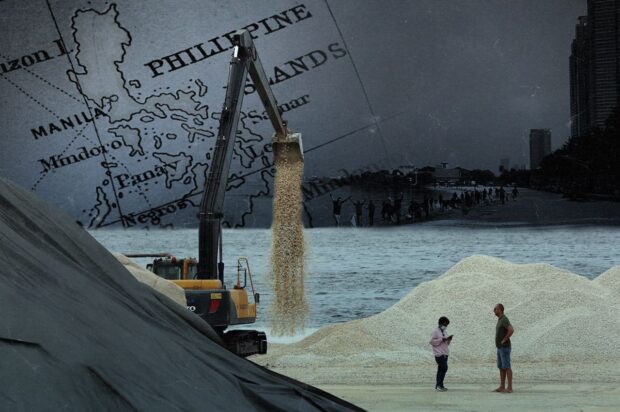
INQUIRER FILE PHOTO / MANILA BAY FACEBOOK ACCOUNT PHOTO
MANILA, Philippines—The Department of Environment and Natural Resources (DENR) has announced the start of a review of reclamation projects in Manila Bay, a move which groups described as “welcome,” but “long overdue.”
At a Palace briefing last week, Environment Secretary Maria Antonia Yulo-Loyzaga said that the DENR had been conducting a “cumulative impact assessment” of some of the reclamation projects in the Manila Bay area.
“Globally, the practice whenever you have several projects in a single ecosystem, you need a cumulative impact assessment and so we are undertaking that,” she said.
“We are looking at compliance for those that have already begun working and also calling them in. So we are talking to those who have already started (reclaiming land),” she said.
Loyzaga said that the agency is looking into possible violations of a party involved in some of the reclamation projects in Manila Bay. However, the DENR chief refused to disclose identities and details of violations.
“Since the release of the information is new, they will be called in for a technical conference to see whether they can have an explanation for the observed potential noncompliance,” said Loyzaga.
“We are looking at each one of those specific conditions and seeing whether they complied,” she added.
‘Long overdue’
In a statement, militant fishers’ group Pambansang Lakas ng Kilusang Mamamalakaya ng Pilipinas (Pamalakaya) described the DENR’s recent move to monitor compliance in reclamation projects in Manila Bay as a “rare initiative” which it welcomes, despite being “long overdue.”
“While we welcome this rare initiative from the DENR, this has been actually long overdue, because various reclamation projects have already inflicted irreversible damage to marine ecosystems and the livelihood of coastal people,” said Fernando Hicap, Pamalakaya national chair.
“Abandoned fish ponds in some towns in Cavite could’ve been converted into productive mangrove areas but were wiped out for reclamation,” Hicap said.
“While thriving coral reefs in the said province have undoubtedly shrunk due to ongoing dredging and reclamation projects across Manila Bay. These marine resources could’ve been preserved if the DENR did not take its sweet time to make a stand on reclamation,” he added.
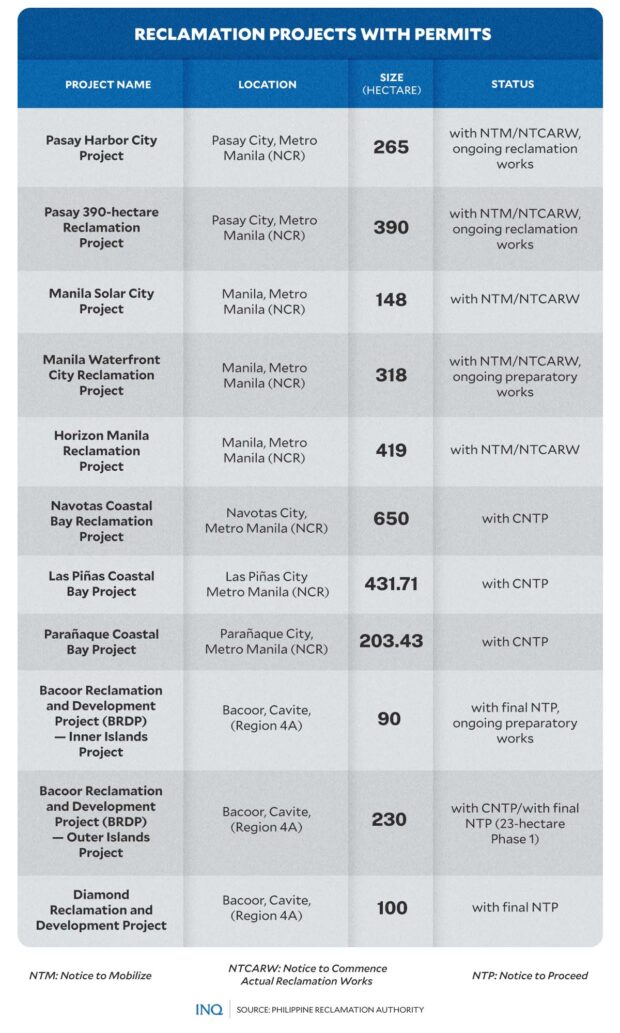
GRAPHIC Ed Lustan
Hicap also urged the DENR chief to work closely with fishing communities and environmental experts to ensure impartiality in reviewing the reclamation projects.
“She should heed the fisherfolk and coastal residents, which constitute the majority of the stakeholders, in regards to preservation and rehabilitation of coastal communities and marine biodiversity,” he said.
The People’s Network for the Integrity of Coastal Habitats and Ecosystems (People’s NICHE), an alliance of marine and coastal protection advocates, likewise welcomed the DENR initiative.
“It has been clear from the very beginning that the scale of impacts of the reclamation projects extend far beyond the coverage area of the project,” the alliance said in a statement.
“Furthermore, independent scientific assessments carried out by community and civil society organizations under People’s NICHE have repeatedly shown the negative effects of reclamation not only on the environment but also [on] coastal communities dependent on Manila Bay,” it added.
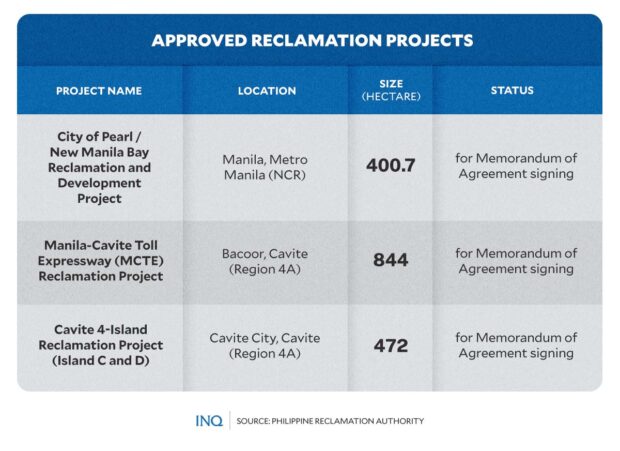
GRAPHIC Ed Lustan
In a separate statement, Agham– Advocates of Science and Technology for the People—emphasized that the investigation must be impartial and transparent.
“For years, Agham, together with other fisherfolk and environmental organizations, warned about the potential ecological and social impacts that reclamation projects pose,” the group of scientists said.
“In fact, mangroves have been cut down in Bulacan since 2018 due to the construction of San Miguel Corporation’s New Manila International Airport (NMIA) project, and fisherfolk in the area were also prohibited from fishing near the area,” said Jerwin Baure, public information officer of Agham.
“Meanwhile, fisherfolk in Cavite also reported a decline in their catch due to dredging activities related to NMIA, as sand extracted from Cavite is used as filling material for the reclamation project in Bulacan,” Baure added.
Rehabilitate Manila Bay
Despite being long overdue, the DENR decision to assess the projects remains crucial as reclamation could affect the agency’s mandate to rehabilitate Manila Bay.
In 2011, the Supreme Court, through a writ of continuing mandamus, ordered the DENR and several government agencies to help clean up and rehabilitate Manila Bay.
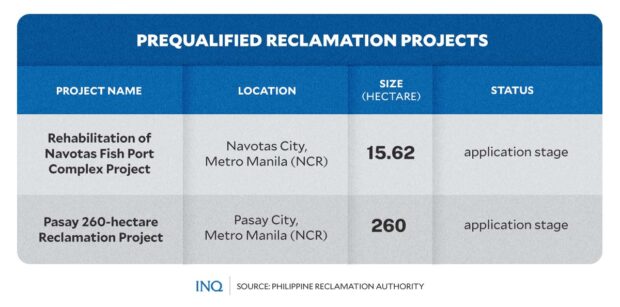
GRAPHIC Ed Lustan
“What we are concerned about is our task in terms of implementing that mandamus is actually going to be impeded by some of these developments,” Loyzaga admitted.
Loyzaga explained that reclamation may disturb the sewerage treatment plants that are already in place.
READ: Development projects may hinder DENR’s SC mandate to rehabilitate Manila Bay
The mandamus was issued in December 2008 following a complaint filed by “concerned citizens of Manila Bay” regarding the alleged inaction of the government on Manila Bay’s decay.
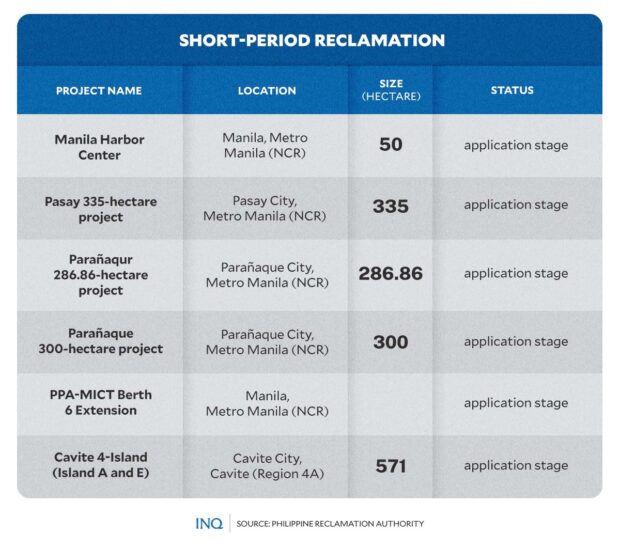
GRAPHIC Ed Lustan
“Allowing, or by just keeping mum on destructive reclamation is a violation of the said mandamus,” Hicap said.
Total ban on reclamation projects
However, Agham noted that efforts to rehabilitate Manila Bay would be “rather impossible… if the sea is turned to dry land, preventing marine organisms from establishing their populations.”
“As the DENR undertakes its investigation, we continue to call for a moratorium on reclamation and dredging in Manila Bay,” said Agham’s Baure.
“The DENR should immediately implement this moratorium as environmental conservation must be prioritized amid the climate crisis that we are facing right now,” he said.
“We urge the environment agency to exert its full commitment in protecting the environment before it’s too,” he added.
People’s NICHE, in a statement, echoed the call to put all reclamation projects in the area on hold to prevent any further harm from taking place in Manila Bay,
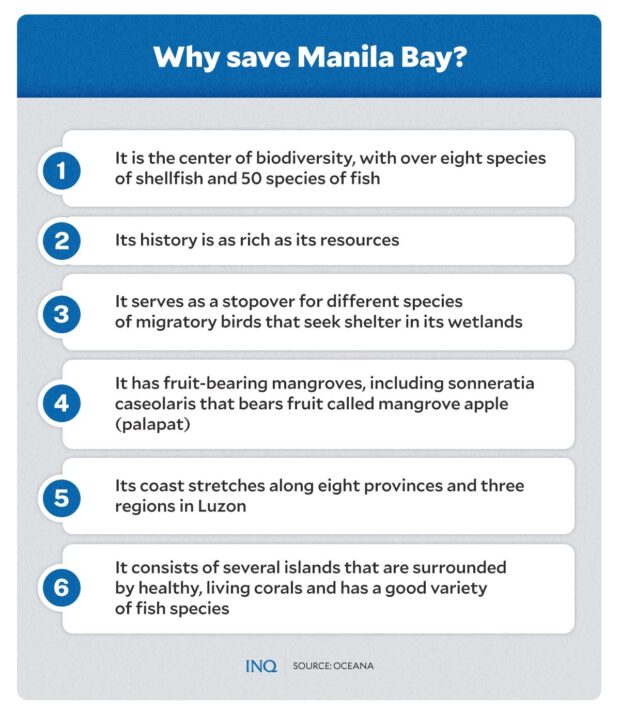
GRAPHIC Ed Lustan
“We, therefore, declare a moratorium on such projects until at least this cumulative assessment is completed. In addition to this, we urge the DENR to formally involve community and civil society organizations in assessing the impacts of reclamation projects,” the alliance said.
Various environmental and fisherfolk groups have repeatedly called on the government to unconditionally revoke all environmental compliance certificates for all 22 reclamation projects in Manila Bay on environmental and socio-economic grounds.
According to Agham, People’s NICHE had already requested a moratorium on ongoing reclamation projects in a dialogue with the DENR last April.
However, the dumping of soil on the coasts of Manila Bay and extraction of sand from the seabed in the municipal waters of Cavite persisted two months after the dialogue.
Disastrous impacts
Data from the Philippine Reclamation Authority showed that there are 22 reclamation projects in Manila Bay that are at various stages of development.
According to Oceana, a nonprofit international advocacy organization dedicated to protecting the world’s oceans, these reclamation projects would lead to natural hazards, such as flooding, in the long run.
Previous studies have shown that dump-and-fill activities—such as what was done to put in place the Dolomite Beach—would exacerbate Manila Bay’s vulnerability to environmental hazards and extreme weather events, like flooding, storm surges, land subsidence, and liquefaction.
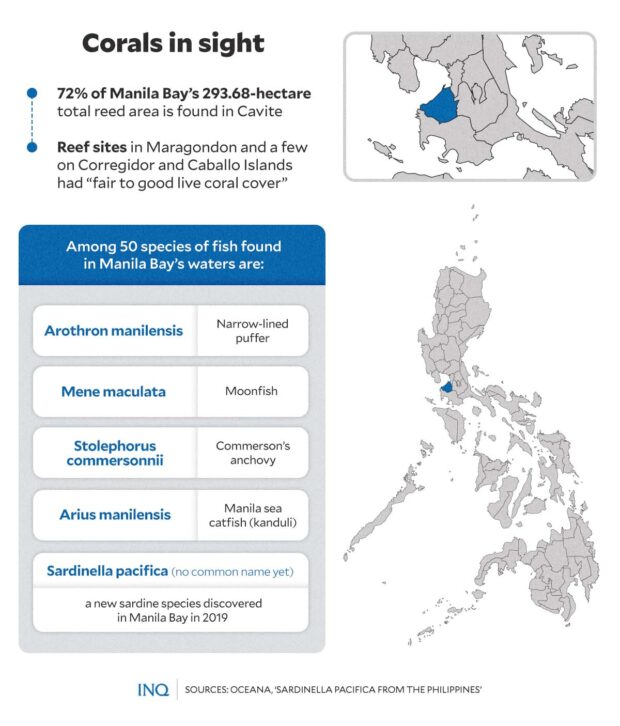
GRAPHIC Ed Lustan
As a result, these projects would endanger the lives of millions of residents along the Manila Bay coastal areas.
“According to experts, Manila Bay is also not safe for reclamation and similar coastal development activities due to the existence of many natural hazards, such as land subsidence (sinking), flooding, and storm surges brought about by stronger typhoons,” lawyer Rose-Liza Eisma-Osorio, legal and policy director of Oceana, previously told INQUIRER.net.
“We are now seeing this in the recent flooding in Manila even if there was no typhoon,” she explained.
“We cannot ignore the fact that reclaiming our coastlines in Manila Bay is like putting a plug on a bathtub full of water and closing the natural outflow of water towards the bay.”
Oceana added that reclamation projects and the illegal dumping and filling of Manila Bay destroy critical life support systems, violate environmental rights, and deprive the country’s artisanal fisherfolk of their livelihood and food security.